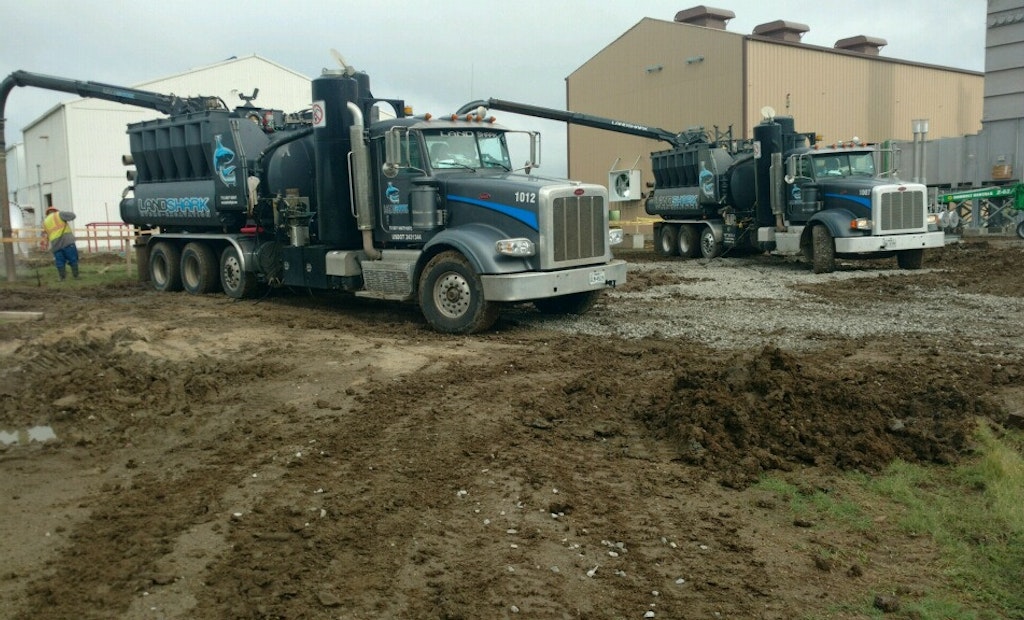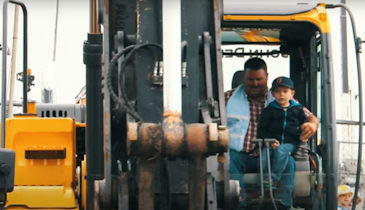Interested in Municipal/Industrial?
Get Municipal/Industrial articles, news and videos right in your inbox! Sign up now.
Municipal/Industrial + Get AlertsWhen Hurricane Harvey hit Texas on Friday, Aug. 25, Houston and its surrounding suburbs were left in shambles.
Landshark Hydro-Excavation, located in Pearland about 20 miles southeast of Houston, survived the storm relatively unscathed. However, the streets around the company’s office were barricaded and impassable for days. President and CEO Ken Sugawara wasn’t able to get into the company’s office until Aug. 29, four days after the hurricane hit. Landshark has been busy ever since.
Busy Days Ahead
Once in the office, Sugawara started fielding call after call from businesses in need of the company’s emergency response services.
“It started piling up as soon as we were able to get back in here,” says Sugawara. “We’re going nuts. First off, we have a bunch of work that was delayed anyhow and we were busy as it was. But then, of course, after Harvey, every time we free up a truck and on the weekends we’ll send as many crews out as we can.”
Landshark isn’t a standard hydroexcavation company. It also takes care of environmental waste hauling and industrial vacuuming services. That could be one major reason for the spike in service calls after the hurricane.
The company, which also has an office in Odessa in West Texas, has 32 employees who are out in the field in the Houston area. But to meet demands, Landshark had to hire three additional operators to run hydroexcavation trucks. The company runs both GapVax and Vacall – Gradall Industries equipment.
“On top of what we have, we have two rentals out and I’m getting two more,” says Sugawara about adding more trucks.
A Variety of Work
Landshark has been dealing with everything from large elevator pits to digging out tunnels in Houston. The company is primarily working with three to four businesses where the major focus has been extracting water.
The largest company that Landshark is helping is MD Anderson Cancer Center, one of the nation’s premier cancer hospitals. The facility had to take soil samples of its pit extractions because high fecal matter was detected.
“This particular one, they wanted us to jet rod the lines, clean their outfall lines and then sanitize their pits,” Sugawara says.
Landshark is also assisting property management companies, including Granite Properties in Houston, and environmental consultants.
The four projects Landshark is working on are spread out all around the Houston area, so Landshark has its crews scattered about. Sugawara knew the company would be extremely busy following the hurricane. Landshark’s employees also knew plenty of work and extended hours were on the horizon.
“In the very beginning, everybody is trying to attempt to save whatever they can,” Sugawara says. “At first, it was 24 hours around the clock, swapping crews out, back-and-forth. Now, it is pretty much day work — maybe a little bit longer hours than normal.”
Seeing the Devastation
Sugawara has been on site with some of his crews to get an idea about what they’re having to handle. In his 23 years in the business, he says he has never seen such utter devastation in an area.
“It’s probably the most horrible thing I’ve ever seen,” Sugawara says. “I’ve never seen such disaster in my life. We’ve been through hurricanes here, and I’ve even had my own place flooded. We’re talking piles and piles of debris everywhere. There are places today that are still flooded. It’s bad. It’s the most devastating thing I’ve ever seen in my life.”
But Sugawara says he thinks companies, especially in the medical professional, were better prepared for a hurricane than in years past. He didn’t hear as much about power outages in medical centers due to flooding.
“We had one hurricane years back that the medical centers (thought they) were ready for. And they had all their generators and all their stuff in the basement, and these basements all flooded,” Sugawara says. “I didn’t hear a lot of that going on here. But, keep in mind that they also learned from that scenario, and I believe they took corrective action.”
The cleanup in the greater Houston area has been underway for just a few weeks, and the end is nowhere in sight. Sugawara says there aren’t enough contractors in the upper Gulf Coast to get the work completed quickly.
“I’ve got companies telling me, ‘We’ve got six months’ worth of business for you guys to do,’” Sugawara says. “That’s like doing a capital project for an oil and gas pipeline install or a plant being built. That’s what this seems like, but this isn’t that. This is about flooding; this is about remediation.”






